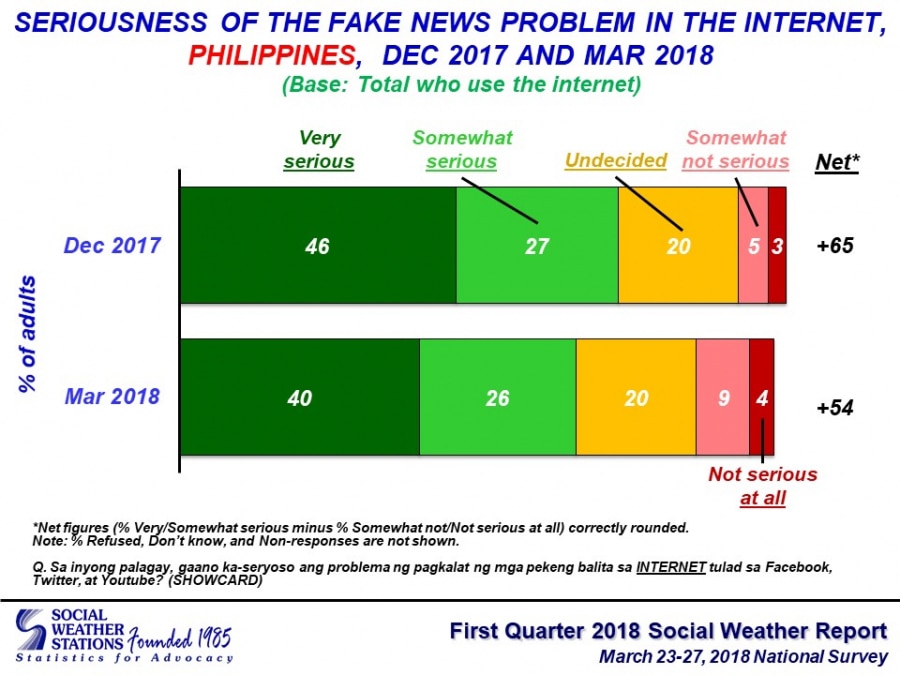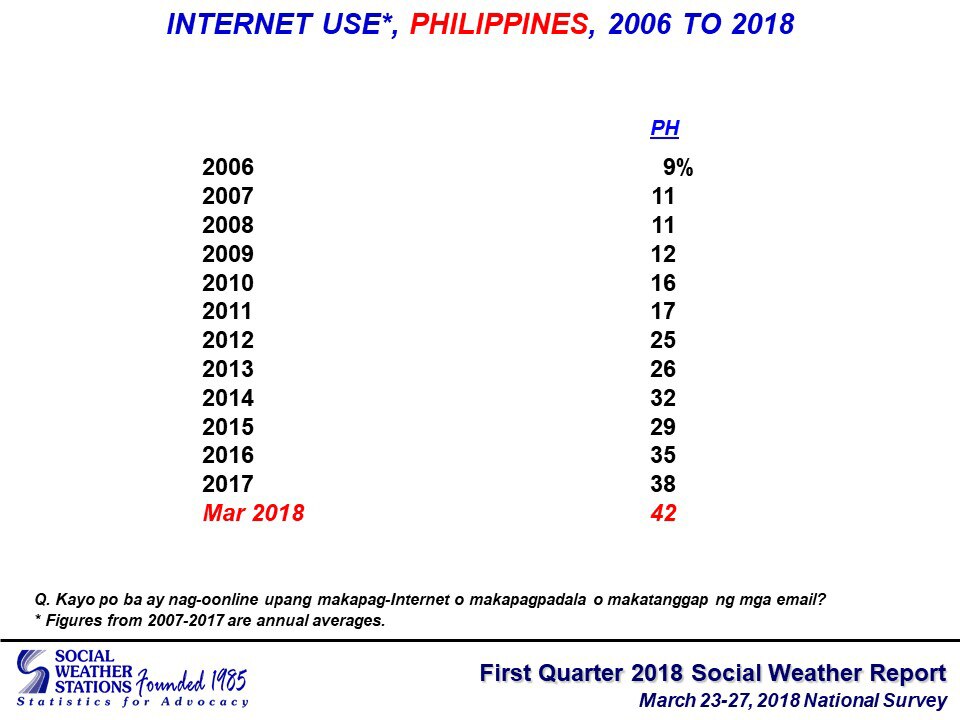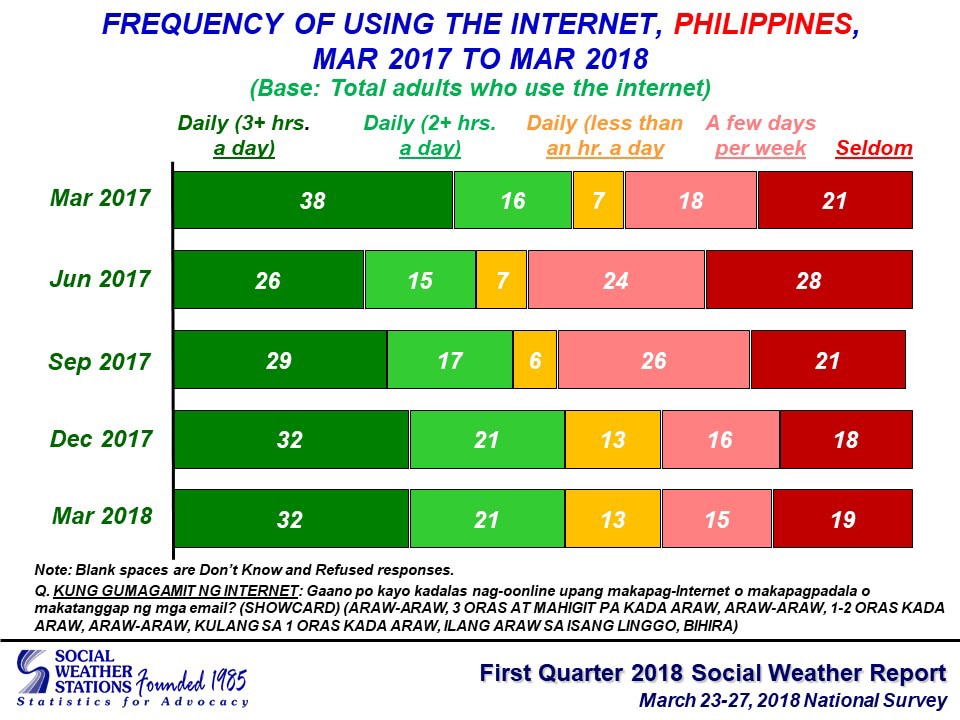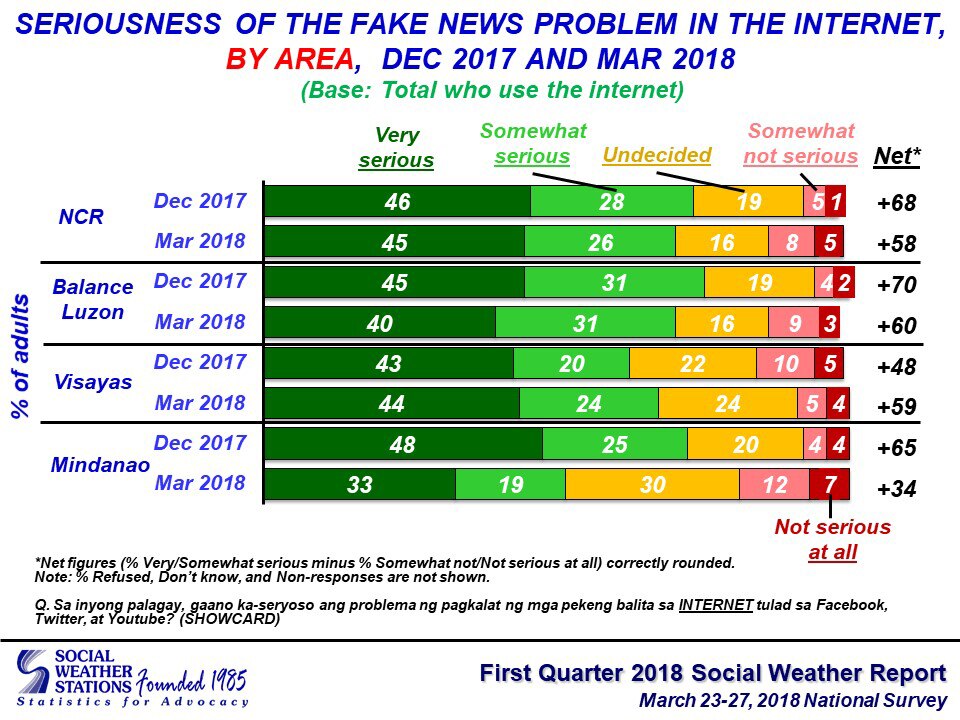Most Pinoy Internet users believe 'fake news' a serious problem: SWS | ABS-CBN

Welcome, Kapamilya! We use cookies to improve your browsing experience. Continuing to use this site means you agree to our use of cookies. Tell me more!
Most Pinoy Internet users believe 'fake news' a serious problem: SWS
Most Pinoy Internet users believe 'fake news' a serious problem: SWS
ABS-CBN News
Published Jun 13, 2018 10:25 AM PHT
|
Updated Jun 13, 2018 10:51 AM PHT
42 percent of of adult Filipinos are now using the Internet
32 percent use the Internet for 3 hours or more daily
67 percent said the fake news problem in the Internet is serious
32 percent use the Internet for 3 hours or more daily
67 percent said the fake news problem in the Internet is serious
MANILA - Majority of Filipino Internet users believe "fake news" or false information on the internet has become a serious problem, a Social Weather Stations survey revealed Wednesday.
MANILA - Majority of Filipino Internet users believe "fake news" or false information on the internet has become a serious problem, a Social Weather Stations survey revealed Wednesday.
The survey, fielded last March 23 to 27, 2018, showed 67 percent of adult Filipino Internet users say fake news on the internet is a serious problem. Around 20 percent were undecided while 13 percent said fake news is not a serious problem, SWS said.
The survey, fielded last March 23 to 27, 2018, showed 67 percent of adult Filipino Internet users say fake news on the internet is a serious problem. Around 20 percent were undecided while 13 percent said fake news is not a serious problem, SWS said.
A separate survey completed last December 2017, meanwhile, showed 60 percent or 6 of 10 Filipinos believe that fake news in the traditional media is also a serious problem.
A separate survey completed last December 2017, meanwhile, showed 60 percent or 6 of 10 Filipinos believe that fake news in the traditional media is also a serious problem.
Both the March and December surveys used face-to-face interviews of 1,200 adults (18 years old and above) nationwide. The surveys had sampling error margins of ±3% for national percentages and ±6% each for Metro Manila, Balance of Luzon, Visayas and Mindanao.
Both the March and December surveys used face-to-face interviews of 1,200 adults (18 years old and above) nationwide. The surveys had sampling error margins of ±3% for national percentages and ±6% each for Metro Manila, Balance of Luzon, Visayas and Mindanao.
ADVERTISEMENT
The March 2018 survey showed that 42 percent of adult Filipinos are now using the Internet, compared to 41% in June 2017.
The March 2018 survey showed that 42 percent of adult Filipinos are now using the Internet, compared to 41% in June 2017.
"The annual average proportion of Internet users nationwide was 9% when SWS first surveyed it in 2006. It rose to 11% in 2007 and increased steadily to 38% in 2017," SWS said.
"The annual average proportion of Internet users nationwide was 9% when SWS first surveyed it in 2006. It rose to 11% in 2007 and increased steadily to 38% in 2017," SWS said.
The survey showed that among the 42 percent who are Internet users, a plurality of 32 percent use it more than 3 hours daily while 21 percent use it more than 2 hours daily.
The survey showed that among the 42 percent who are Internet users, a plurality of 32 percent use it more than 3 hours daily while 21 percent use it more than 2 hours daily.
SWS said 13 percent of Filipino Internet users go online less than an hour a day, while 15 percent use it a few days per week. The remaining 19 percent said they seldom use the Internet.
SWS said 13 percent of Filipino Internet users go online less than an hour a day, while 15 percent use it a few days per week. The remaining 19 percent said they seldom use the Internet.
The March 2018 survey found that 51 percent among those who seldom use the Internet said the fake news problem is serious, followed by 64 percent among those who use it a few days per week and those who use it less than an hour daily, 69 percent among those who use it 1-2 hours daily, and 77 percent among those who use it 3 hours or more daily.
The March 2018 survey found that 51 percent among those who seldom use the Internet said the fake news problem is serious, followed by 64 percent among those who use it a few days per week and those who use it less than an hour daily, 69 percent among those who use it 1-2 hours daily, and 77 percent among those who use it 3 hours or more daily.
The proportion of Internet users who said there is a serious problem of fake news in the Internet was higher in Metro Manila and Balance Luzon, both at 71 percent, compared to Visayas at 68 percent, and Mindanao at 52 percent.
The proportion of Internet users who said there is a serious problem of fake news in the Internet was higher in Metro Manila and Balance Luzon, both at 71 percent, compared to Visayas at 68 percent, and Mindanao at 52 percent.
A Senate investigation earlier invited key communication officials, journalists, and other concerned parties to tackle the problem of fake news.
A Senate investigation earlier invited key communication officials, journalists, and other concerned parties to tackle the problem of fake news.
Facebook has already tagged "fact-checkers" in various countries in a bid to stop the spread of false information. The social media giant is also facing investigation in the US over data misuse.
Facebook has already tagged "fact-checkers" in various countries in a bid to stop the spread of false information. The social media giant is also facing investigation in the US over data misuse.
ADVERTISEMENT
ADVERTISEMENT





